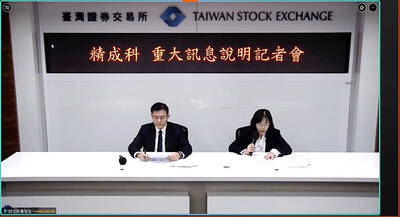US Federal Reserve Bank of Dallas President Richard Fisher said the central bank should stick to its strategy of gradually reducing bond purchases even as harsh winter weather slows US economic growth.
“I am not persuaded continuing to taper should be altered,” Fisher yesterday said in a Bloomberg Radio interview in Dallas with Kathleen Hays and Vonnie Quinn. “Obviously, weather is playing a significant role here.”
“If you look at activity in the west and the southwest and Florida, you are seeing pretty robust activity,” said Fisher, who votes on policy this year. “Even the Fed cannot offset Mother Nature. The economy has been moving in the right direction.”

Photo: Reuters
Fed Chair Janet Yellen pledged this week to maintain her predecessor’s policies by trimming stimulus in “measured steps,” and signaled the bar is high for a change in that plan.
Only a “notable change in the outlook” for the economy would prompt policymakers to alter the pace for tapering the Fed’s US$65 billion in monthly bond buying, Yellen said during congressional testimony.
Fisher said he will favor trims in bond buying at each Federal Open Market Committee meeting unless he sees “something truly frightening in the economy.”
US industrial output unexpectedly declined last month by the most since May 2009, adding to evidence severe weather weighed on the economy. The 0.8 percent decrease at manufacturers followed a revised 0.3 percent gain the prior month that was weaker than initially reported, figures from the Fed showed yesterday.
Sales at US retailers fell last month by the most since June 2012. The 0.4 percent decrease followed a revised 0.1 percent drop in December last year that was previously reported as an increase, according to Commerce Department figures released on Friday.
The disappointing data on manufacturing and retail sales followed two straight employment reports that fell short of economists’ forecasts. Payrolls grew by 113,000 last month and by 75,000 in December last year, the weakest back-to-back gains in three years.
Fisher said Fed officials should discuss changing their forward guidance on the possible timing for increasing the benchmark interest rate.
“We need further discussion about how we refine that language,” he said.
St Louis Fed President James Bullard last week said the central bank will probably signal the path for interest rates based on “qualitative” judgments of the economy, moving away from a pledge to begin considering an increase in the main interest rate when unemployment falls below 6.5 percent.
The 6.5 percent threshold is a “crude instrument,” Fisher said.
The jobless rate unexpectedly declined last month to 6.6 percent, according to a US Department of Labor report.
Some job markets may be tightening with “severe labor shortages in certain areas,” including construction workers, technology workers and auditors, Fisher said. “We are hearing reports, at least in my district, of some labor price pressures.”

Honda Motor Co absorbing Nissan Motor Co could give the two struggling Japanese brands the scale they need to take on China’s BYD Co (比亞迪), sales figures released yesterday showed. Honda, which earlier this week sketched out plans for a deal that amounts to an acquisition of Nissan, sold 3.43 million cars globally in the first 11 months of this year. Nissan said it sold just over 3 million. China’s biggest automaker BYD sold 3.76 million vehicles over the same period — a clear illustration of how Nissan and Honda are weak alone, but together might have a fighting chance. Honda and Nissan

SEMICONDUCTORS: Samsung and Texas Instruments would receive US$4.75 billion and US$1.6 billion respectively to build one chip factory in Utah and two in Texas Samsung Electronics Co and Texas Instruments Inc completed final agreements to get billions of US dollars of government support for new semiconductor plants in the US, cementing a major piece of US President Joe Biden administration’s CHIPS and Science Act initiative. Under binding agreements unveiled Friday, Samsung would get as much as US$4.75 billion in funding, while Texas Instruments stands to receive US$1.6 billion — money that would help them build facilities in Texas and Utah. The final deals mean the chipmakers can begin collecting the funding when their projects hit certain benchmarks. Though the terms of Texas Instruments’ final agreement is

Call it an antidote to fast fashion: Japanese jeans hand-dyed with natural indigo and weaved on a clackety vintage loom, then sold at a premium to global denim connoisseurs. Unlike their mass-produced cousins, the tough garments crafted at the small Momotaro Jeans factory in southwest Japan are designed to be worn for decades, and come with a lifetime repair warranty. On site, Yoshiharu Okamoto gently dips cotton strings into a tub of deep blue liquid, which stains his hands and nails as he repeats the process. The cotton is imported from Zimbabwe, but the natural indigo they use is harvested in Japan —

Printed circuit board (PCB) maker Global Brands Manufacture Ltd (精成科技) is to fully acquire Japanese peer Lincstech Co for about NT$8.4 billion (US$256.9 million) as the company aims to add high-end PCBs to its PC-centric product lineups. The company also expects the deal to help expand its manufacturing sites in Southeast Asia, as local firms diversify to mitigate geopolitical risks. “The acquisition will mean an important step for the company to further expand its presence in Southeast Asia and globally,” Global Brands Manufacture chief financial officer Weng Chia-yu (翁家玉) said at a news conference in Taipei yesterday. The company has set up manufacturing